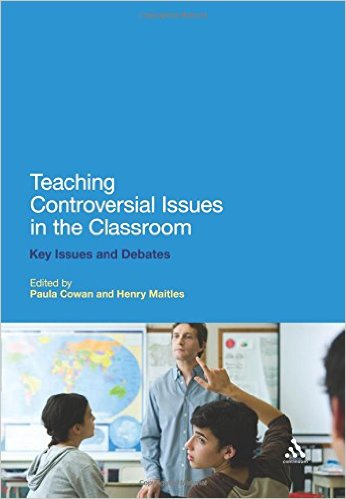
Teaching Controversial Issues in the Classroom: Key Issues and Debates
- wikipedia-Lifelong_learning
- Pg. 21
- Pg. 229
Sunday to Thursday: 09:00-17:00
Fridays and Holiday eves: 09:00-14:00
Yad Vashem is closed on Saturdays and all Jewish Holidays.
Entrance to the Holocaust History Museum is not permitted for children under the age of 10. Babies in strollers or carriers will not be permitted to enter.

Teaching Controversial Issues in the Classroom: Key Issues and Debates
Teaching Controversial Issues in the Classroom: Key Issues and Debates
Edited by Paula Cowan and Henry Maitles
London: Continuum, 2012
200 pages
Lifelong learning has been defined as the “lifelong, voluntary, and self-motivated pursuit of knowledge for either personal or professional reasons. As such, it not only enhances social inclusion, active citizenship and personal development, but also competitiveness and employability”.1 In recent years, the European Commission has invested a considerable amount of funds to support a program that enables people at all stages of their lives to take part in stimulating learning experiences, as well as develop the education and training sectors across Europe.
This new book by Cowan and Maitles, geared for educators worldwide though includes the Scottish context, clearly encourages the concept of lifelong learning, recognizing that, “To present controversial issues effectively, teachers need to be well informed about a wide range of social, economic, political and cultural issues. This suggests that there is a case for requiring all intending teachers to take a course – perhaps with the title ‘Understanding the Modern World’ – which would give them insight into both the substantive topics which might feature in a school-based program on controversial issues and the pedagogical approaches which might serve to stimulate pupil interest and motivation.”2
Despite the various challenges that educators face on a daily basis in classrooms, in the United Kingdom and beyond, this collection of articles is based on a very positive premise: Teachers can and do shape the future of our society. In other words, educators make a difference to the lives of young people by promoting positive values, winning students’ hearts and minds as well as developing their pupils’ interest, knowledge, skills and dispositions in the broad areas of citizenship, human rights and democracy.”3 Although these challenging tasks may often be perceived as daunting by many pre-service and in-service teachers, the underlying message of this book is to encourage educators’ motivation and their professional development.
This book is divided into four sections, primarily focusing on issues of citizenship, genocide, the Holocaust, and discrimination. Since Cowan and Maitles have already published a number of articles related to Holocaust education, it is not surprising that they have placed an emphasis on the Holocaust and antisemitism in this volume. Seventeen authors (including teachers as well as former classroom teachers) contributed articles on various topics that have been termed by the editors as “controversial issues,” such as migration, homophobia, nuclear war, visiting the Auschwitz-Birkenau State Museum, and others. Overall, most of the contributors are affiliated with research universities based in the United Kingdom, such as Professors Ian Davies, Alistair Ross and Geoffrey Short just to name a few.
Many of the articles in this book encourage a cross-curricular approach to teaching, including the study of the Holocaust. Practical guidelines for teaching, developed by the International Task Force for Cooperation on Holocaust Education, Remembrance and Research, would have greatly enhanced the contents.
The book’s title, Teaching Controversial Issues in the Classroom: Key Issues and Debates, can be perceived as misleading as one could expect that subjects such as teenage pregnancy, abortion, legalizing prostitution and drug use as well as other health-related topics would appear in such a volume.
At the end of each article, readers will find some questions that can stimulate contemplation as well as suggestions for additional reading. Many of the recommended questions are not necessarily geared for classroom use, but some of them may be applied and or adapted for work with students.
All in all, this volume can be useful to educators who are interested in addressing issues related to racism, the Holocaust, and citizenship – further encouraging teachers to enroll in training courses and become better equipped with tools and techniques for their professional development. Ultimately, it is hoped that teachers who demonstrate their passion for lifelong learning will successfully transmit this important educational message to their students.

Thank you for registering to receive information from Yad Vashem.
You will receive periodic updates regarding recent events, publications and new initiatives.

"The work of Yad Vashem is critical and necessary to remind the world of the consequences of hate"
Paul Daly
#GivingTuesday
Donate to Educate Against Hate


Worldwide antisemitism is on the rise.
At Yad Vashem, we strive to make the world a better place by combating antisemitism through teacher training, international lectures and workshops and online courses.
We need you to partner with us in this vital mission to #EducateAgainstHate
The good news:
The Yad Vashem website had recently undergone a major upgrade!
The less good news:
The page you are looking for has apparently been moved.
We are therefore redirecting you to what we hope will be a useful landing page.
For any questions/clarifications/problems, please contact: webmaster@yadvashem.org.il
Press the X button to continue



